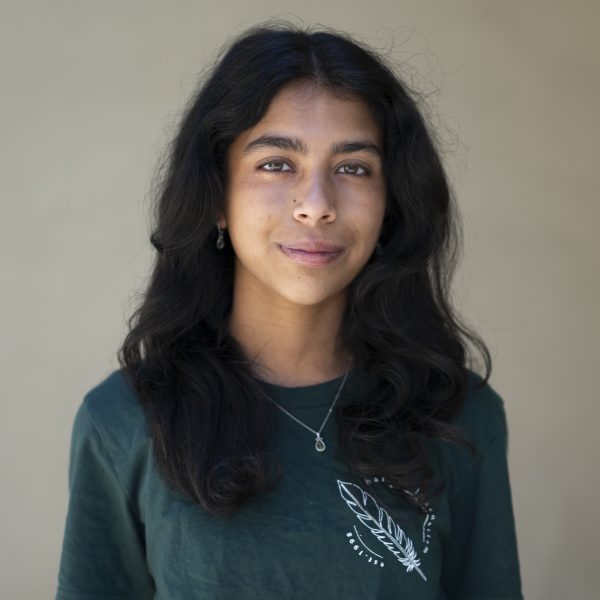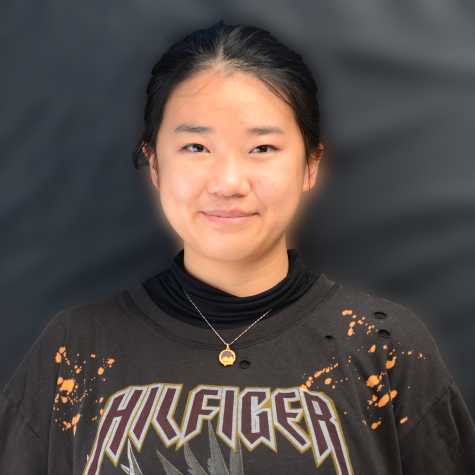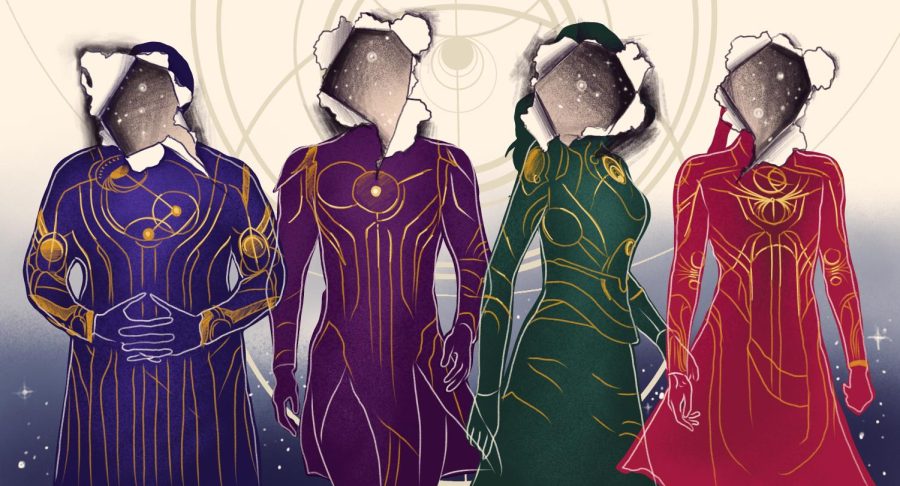Marvel’s ‘Eternals’ falls flat in portrayal of diverse characters
‘Eternals’ misrepresents its characters despite label as most diverse Marvel production
These characters made the movie Marvel’s most diverse release yet, and I am grateful that Zhao chose to increase the inclusivity of the film when adapting it from the comics. However, the diverse characters lack sufficient portrayal as exemplified by the poor memorability of Kingo’s character. It’s not enough to simply include these characters, Marvel needs to represent them properly.
There they were. All 10 of them, capes undulating in the wind, heads held high as they surveyed the arid landscape, solemnly nodding at those thanking them for their heroic efforts. One of them stood little to the right in deep purple armor, a faint smile painting his face. For the first time in the 13-year-long history of the Marvel Cinematic Universe (MCU), I saw a South Asian Marvel character on the movie screen. Someone with the same skin color as me was a hero.
And I didn’t even know his name until after the movie.
Marvel’s recent production “Eternals,” which came out on Nov. 5, 2021, features 10 ancient immortals designated with the task of protecting those residing on Earth. In an interview with the Entertainment Weekly magazine, “Eternals” director Chloé Zhao explained her aim to humanize the characters by providing them with internal struggles and by reflecting the diversity of the world in the cast. She achieved the latter by including various minority groups through characters such as the Pakistani hero Kingo with the ability to project energy, played by Kumail Nanjiani and the Eternal Phastos with the power to levitate objects, who is openly gay and Black, played by Brian Tyree Henry.
Additionally, half the group is female, and the movie included Marvel’s first deaf superhero, Makkari, played by Lauren Ridloff, who has super speed. The film is based off of the “Eternals (1976) #1” Marvel comic book in which Makkari is a hearing, white male contrasting with the identity of the deaf, African American woman Zhao cast for the role.
These characters made the movie Marvel’s most diverse release yet, and I am grateful that Zhao chose to increase the inclusivity of the film when adapting it from the comics. However, the diverse characters lack sufficient portrayal as exemplified by the poor memorability of Kingo’s character. It’s not enough to simply include these characters, Marvel needs to represent them properly.
I had waited so long for South Asian representation in the MCU only to struggle with recollecting Kingo’s name after the movie had ended, demonstrating Marvel’s failure to provide depth for his character. I also found the simplification of South Asian culture appalling as a majority of Kingo’s scenes revolved around his Bollywood career.
What further escalated my qualms with the movie was when two non-Indian individuals married in a supposedly Indian wedding. The couple kisses at the end of the ceremony, an unconventional occurrence at traditional, conservative Indian weddings.
Marvel should have researched more about Indian weddings if they wanted to include that scene in the film. For a more accurate depiction of the ceremony, Marvel could have, for example, featured the diverse array of South Asian dishes typically present at Indian weddings. Proper portrayal of the event would both help South Asian viewers connect with the movie more and educate those who either don’t know about or have never attended an Indian wedding.
With the exception of Kingo, the Eternals each face personal struggles in the movie from unrequited love to memory loss. Kingo was also the only Eternal not present at the major battle of the film as he claimed to want peace, not war. His lack of character depth and presence in the film raises a question as to why Marvel chose to portray him in this way. Does his worth as a hero not measure up to the others? Is he not an essential part of the team?
An Indian character in the film, Karun Patel, Kingo’s personal assistant, played by Harish Patel, simulates the Indian stereotype in American films: an overweight individual with an Indian accent only present for comic relief. Karun didn’t add to the plot nor will he make an impact in later films. His only purpose was to evoke laughter from the audience by perpetuating stereotypes.
While Kingo was not the primary focus of the movie, I’m grateful that Marvel attempted to include aspects of South Asian culture. Next time, I hope to see them do it justice because these portrayals lead me to consider whether Marvel believes comic relief, a flawed simulation of an Indian wedding and a one-minute clip of a Bollywood performance is truly all my culture has to offer.
“Eternals” contains another flaw lying with the female character Sprite, played by Lia McHugh, who has the ability to create illusions. The comics version of Sprite is male, so when I first heard about the gender switch for the movie, I was excited that Marvel was making an effort to include more female heros.
For the first half of the film, I enjoyed Sprite’s scenes as she had a nonchalant yet mischievous personality. My amusement quickly faded with the revelation of Sprite’s infatuation with another Eternal, Ikaris, played by Richard Madden, who can fly and shoot lasers from his eyes.
Her playful personality completely disappears towards the end of the film, replaced with an I’d-do-anything-for-love persona. Despite Ikaris betraying the entire team of Eternals, including Sprite herself, she blindly follows him in carrying out his devious plan and risks the fate of the entire Earth to help someone who rarely acknowledges her presence. All of her actions are influenced by her unrequited love for Ikaris, exemplifying again how Marvel reduced a potentially diverse character to a stereotype. In this case, Sprite plays into the stereotype that women are primarily driven by emotion and love.
Only 15 out of 26 MCU movies pass the Bechdel test, which assesses the quality of female representation in films and series based on the following criteria: two women are present in the production, the two women converse and the discussion does not revolve around a man. The test already sets the bar low for female inclusion and portrayal in productions, yet only about half of Marvel movies pass the evaluation.
Marvel needs to start accurately and properly representing characters from minority groups in their productions as it will promote an environment of inclusivity and appeal to more individuals with different identities. It can also serve to educate the public about various topics. For instance, there was a 250% surge in searches for “learn sign language for beginners” after the release of “Eternals,” according to research from Preply, as the film introduced the first deaf superhero, Makkari, in it. I myself learned some sign language over Thanksgiving break and discovered facts about the language I’d never known before. For instance, I was unaware that even sign language could have accents.
Over the past couple years, Marvel has made efforts to increase diversity, and they’ve made progress from their original main characters who were white, heterosexual and almost all male. “The Falcon and the Winter Soldier,” released on March 19 last year, presented the first Black Captain America. Likewise, “Shang-Chi and the Legend of the Ten Rings,” released Sept. 3, 2021, starred a Chinese hero Shang-Chi and an all-Asian cast.
Even “Eternals” was a step in the right direction as there were many “firsts” in the movie. The group’s Asian leader who can manipulate matter, Sersi, played by Gemma Chan, was the first woman to deliver a final blow in a battle during a non-solo film and Phastos was the first openly gay character.
Despite the movie’s label as the most diverse MCU production yet, the film’s inability to represent its characters properly reflects on Marvel’s approach to inclusivity. The sole reason behind releases with incomplete representation such as “Eternals” is to tick diversity check boxes. If Marvel receives complaints about their lack of diversity, they now have the movies and shows to check the metaphorical boxes even though the productions lack quality in the representation of the diverse characters. While I appreciate Marvel’s efforts to increase diversity, there’s still more change that the franchise needs to implement.
In future releases, I’d like to see Marvel further research cultures represented in the films and accurately reflect those details in those productions. As seen with Makkari and Kingo, this can help more viewers connect to the movie as well as educate audiences on various topics. Instead of reducing diverse characters to clichés, Marvel should allow them to transcend barriers of their stereotypes by providing them with unique personality traits and character depth.
I don’t want any more of the stale, bland dish of diversity that Marvel is feeding audiences right now. I want the flavorful, rich one. I want the full meal.

Kinnera Mulam (12) is the co-editor-in-chief of the Winged Post, and this is her fourth year on staff. This year, Kinnera hopes to get to know all the...

Michelle Liu (12) is the co-editor-in-chief of The Winged Post. She joined the journalism program in her sophomore year as a reporter and became the Winged...


















![“[Building nerf blasters] became this outlet of creativity for me that hasn't been matched by anything else. The process [of] making a build complete to your desire is such a painstakingly difficult process, but I've had to learn from [the skills needed from] soldering to proper painting. There's so many different options for everything, if you think about it, it exists. The best part is [that] if it doesn't exist, you can build it yourself," Ishaan Parate said.](https://harkeraquila.com/wp-content/uploads/2022/08/DSC_8149-900x604.jpg)




![“When I came into high school, I was ready to be a follower. But DECA was a game changer for me. It helped me overcome my fear of public speaking, and it's played such a major role in who I've become today. To be able to successfully lead a chapter of 150 students, an officer team and be one of the upperclassmen I once really admired is something I'm [really] proud of,” Anvitha Tummala ('21) said.](https://harkeraquila.com/wp-content/uploads/2021/07/Screen-Shot-2021-07-25-at-9.50.05-AM-900x594.png)







![“I think getting up in the morning and having a sense of purpose [is exciting]. I think without a certain amount of drive, life is kind of obsolete and mundane, and I think having that every single day is what makes each day unique and kind of makes life exciting,” Neymika Jain (12) said.](https://harkeraquila.com/wp-content/uploads/2017/06/Screen-Shot-2017-06-03-at-4.54.16-PM.png)








![“My slogan is ‘slow feet, don’t eat, and I’m hungry.’ You need to run fast to get where you are–you aren't going to get those championships if you aren't fast,” Angel Cervantes (12) said. “I want to do well in school on my tests and in track and win championships for my team. I live by that, [and] I can do that anywhere: in the classroom or on the field.”](https://harkeraquila.com/wp-content/uploads/2018/06/DSC5146-900x601.jpg)
![“[Volleyball has] taught me how to fall correctly, and another thing it taught is that you don’t have to be the best at something to be good at it. If you just hit the ball in a smart way, then it still scores points and you’re good at it. You could be a background player and still make a much bigger impact on the team than you would think,” Anya Gert (’20) said.](https://harkeraquila.com/wp-content/uploads/2020/06/AnnaGert_JinTuan_HoHPhotoEdited-600x900.jpeg)

![“I'm not nearly there yet, but [my confidence has] definitely been getting better since I was pretty shy and timid coming into Harker my freshman year. I know that there's a lot of people that are really confident in what they do, and I really admire them. Everyone's so driven and that has really pushed me to kind of try to find my own place in high school and be more confident,” Alyssa Huang (’20) said.](https://harkeraquila.com/wp-content/uploads/2020/06/AlyssaHuang_EmilyChen_HoHPhoto-900x749.jpeg)



